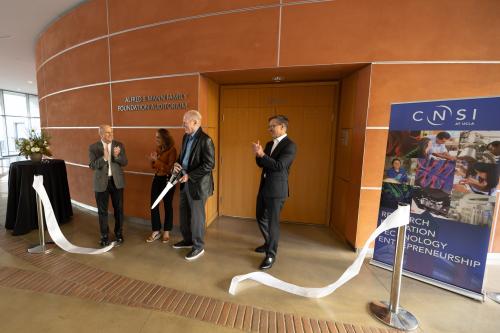
Ribbon cutting celebrates $5 million gift to translate promising research from lab to clinic
This past spring, a $5 million gift from the Alfred E Mann Family Foundation established the Alfred E Mann Family Foundation Research Acceleration Fund at the Eli and Edythe Broad Center of Regenerative Medicine and Stem Cell Research at UCLA and the Alfred E Mann Family Foundation Technology Development Fund at the California NanoSystems Institute at UCLA.
Both funds facilitate interdisciplinary collaboration among UCLA scientists and ensure that promising UCLA research on new treatments for diseases and innovative biomedical devices can advance from the lab to clinical settings.
Today, in honor of the gift, the auditorium on the first floor of the CNSI Building was renamed the Alfred E Mann Family Foundation Auditorium and a portion of the third floor of the Terasaki Life Sciences Building, home to the Broad Stem Cell Research Center, was named the Alfred E Mann Family Foundation Foyer.
UCLA leaders and faculty from the stem cell center and CNSI joined representatives from the Alfred E Mann Family Foundation at the ribbon cutting ceremony.
“There are no two better places on campus to advance research and technology development,” said Dr. Thomas Rando, the director of the Broad Stem Cell Research Center. “In the coming years we will be able to point to advances in stem cell biology that I know we will be able to trace back to this gift.”
“This generous gift allows us to tackle significant problems of the 21st century,” said Jeff F. Miller, UCLA’s Fred Kavli Professor of NanoSystems Sciences and the director of CNSI. “We have already seen a transformational effect on our research efforts such as imaging proteins, making precision antibiotics and basic research in materials and cell biology which will have a major impact for years to come.”
Alfred Mann, who lived from 1925 to 2016, earned a bachelor’s degree at UCLA and became a physicist, inventor, entrepreneur and philanthropist. Mann founded and helped to fund 17 companies, many of which worked with scientific and research organizations aiming to develop treatments for diabetes, metabolic disease and cancer, blindness and other diseases and conditions.
In 2010, Mann established the Alfred E Mann Family Foundation so that his philanthropy, focused on improving and extending lives, could continue after his death. He was also a member of the National Academy of Engineering and chair of the Southern California Biomedical Council, and he received numerous honors from the private and public sectors.